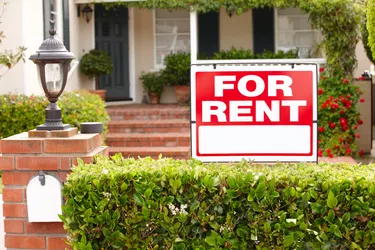
If you're concerned about a rent increase in Florida for 2021, be aware that the state has relatively flexible rent increase laws compared to other states. None of Florida's cities have rent control, so landlords can raise rent with minimal notice. In general, your landlord can't raise your rent on a lease of one year or more until the lease expires. Some tenancy agreements contain provisions allowing rent increases during the rental period, however.
Short-Term Rental vs. Long-Term Lease
Video of the Day
A rental agreement typically applies to a monthly or weekly tenancy period, whereas a lease usually lasts at least one year. A lease generally offers renters greater protection against rent increases because the landlord has to wait out a longer tenancy period before changing any lease terms. A month-to-month rental renews each month, allowing the landlord to increase rent when the month ends and with relatively short notice.
Video of the Day
Florida landlords can raise rent with as little as 15 days' notice on a month-to-month rental. However, your lease agreement may provide for longer notice periods for other events, such as a tenant notice to vacate or a landlord notice to vacate. If so, your landlord may be subject to the same time frame when providing you with a notice to increase your rent if the contract doesn't already spell out specific rent-increase rules.
Delivery Rules for Rent Increase Notices
Florida laws specify how a landlord must deliver a rent increase notice. Notice laws give you time to decide what you want to do about the increase, and delivery laws ensure you receive the notice in an appropriate manner. Landlords must mail or personally deliver rent increase notices. If you aren't at the property at the time of delivery, the landlord can post the notice at your residence.
Responding to Rent Increases
No lease changes can be one-sided decisions, or unilateral. You can either agree to a rent increase or reject it and move out. If you decide not to accept the new rent amount, you can remain in the property through the end of your tenancy as long as you've paid the current rent amount due. A landlord can draft a new year-long lease reflecting the new rent amount.
Note that you may effectively be accepting a rate increase, and you could end up on a month-to-month rental – rather than a long-term lease – if your landlord doesn't provide you with a new lease agreement and you pay the new rent amount.
Unlawful Rent Increase Practices
Florida prohibits landlords from raising rent for discriminatory or retaliatory reasons. Landlords can't raise your rent simply because you request repairs or report code violations. It's also illegal for them to raise your rent based on any of the following:
- Race, religion, color, ancestry or national origin
- Age, marital status or because you have children under 18 years of age
- Sex or sexual orientation
- Physical, mental or perceived handicaps
- Unfavorable military discharge
If you suspect a rent increase is discriminatory, contact an attorney or free legal aid for advice.